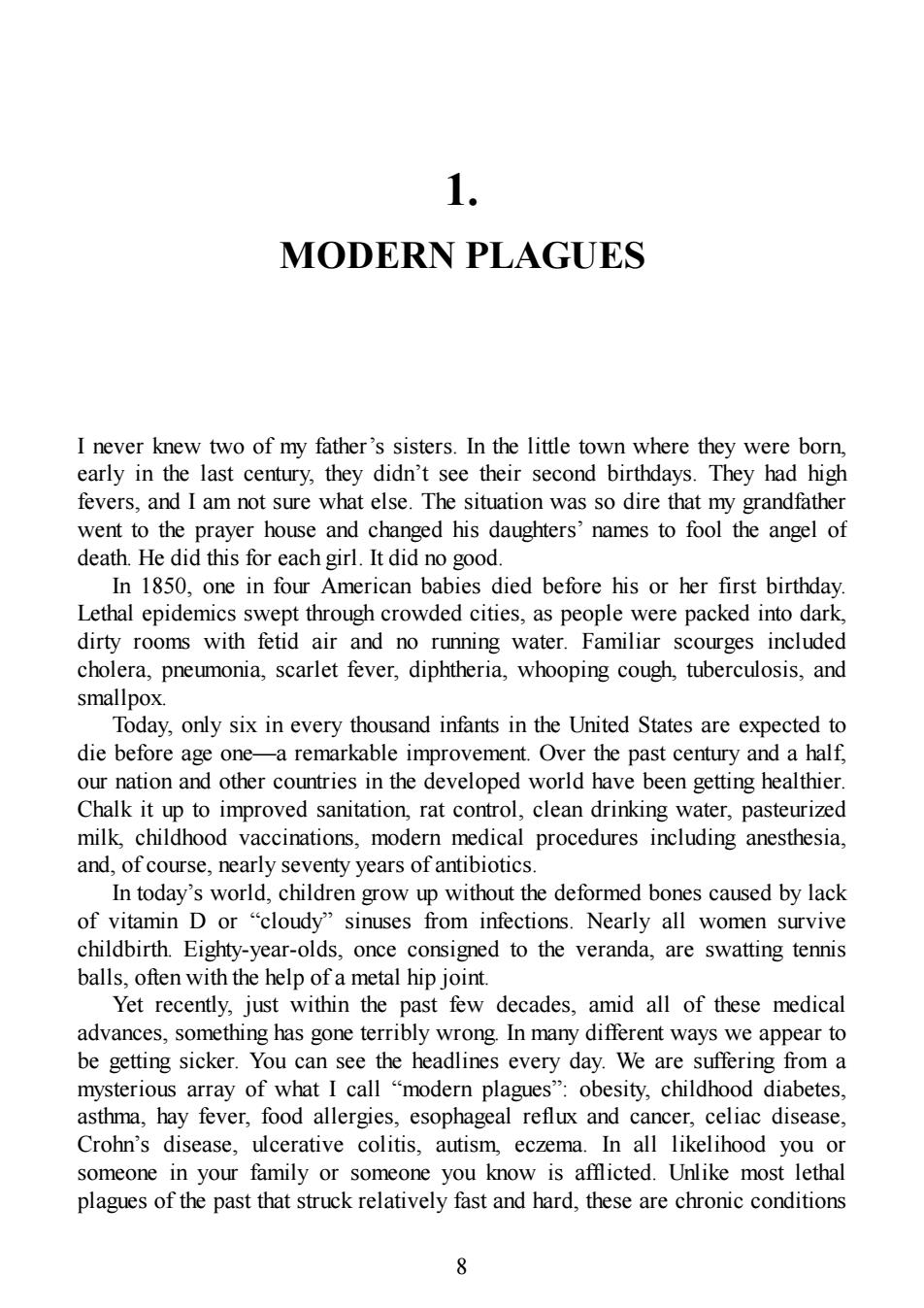正在加载图片...

1. MODERN PLAGUES I never knew two of my father's sisters.In the little town where they were born, early in the last century,they didn't see their second birthdays.They had high fevers,and Iam not sure what else.The situation was so dire that my grandfather went to the prayer house and changed his daughters'names to fool the angel of death.He did this for each girl.It did no good. In 1850,one in four American babies died before his or her first birthday. Lethal epidemics swept through crowded cities,as people were packed into dark, dirty rooms with fetid air and no running water.Familiar scourges included cholera,pneumonia,scarlet fever,diphtheria,whooping cough,tuberculosis,and smallpox. Today,only six in every thousand infants in the United States are expected to die before age one-a remarkable improvement.Over the past century and a half our nation and other countries in the developed world have been getting healthier Chalk it up to improved sanitation,rat control,clean drinking water,pasteurized milk,childhood vaccinations,modern medical procedures including anesthesia, and,of course,nearly seventy years of antibiotics. In today's world,children grow up without the deformed bones caused by lack of vitamin D or "cloudy"sinuses from infections.Nearly all women survive childbirth.Eighty-year-olds,once consigned to the veranda,are swatting tennis balls,often with the help of a metal hip joint. Yet recently,just within the past few decades,amid all of these medical advances,something has gone terribly wrong In many different ways we appear to be getting sicker.You can see the headlines every day.We are suffering from a mysterious array of what I call "modern plagues":obesity,childhood diabetes, asthma,hay fever,food allergies,esophageal reflux and cancer,celiac disease, Crohn's disease,ulcerative colitis,autism,eczema.In all likelihood you or someone in your family or someone you know is afflicted.Unlike most lethal plagues of the past that struck relatively fast and hard,these are chronic conditions1. MODERN PLAGUES I never knew two of my father’s sisters. In the little town where they were born, early in the last century, they didn’t see their second birthdays. They had high fevers, and I am not sure what else. The situation was so dire that my grandfather went to the prayer house and changed his daughters’ names to fool the angel of death. He did this for each girl. It did no good. In 1850, one in four American babies died before his or her first birthday. Lethal epidemics swept through crowded cities, as people were packed into dark, dirty rooms with fetid air and no running water. Familiar scourges included cholera, pneumonia, scarlet fever, diphtheria, whooping cough, tuberculosis, and smallpox. Today, only six in every thousand infants in the United States are expected to die before age one—a remarkable improvement. Over the past century and a half, our nation and other countries in the developed world have been getting healthier. Chalk it up to improved sanitation, rat control, clean drinking water, pasteurized milk, childhood vaccinations, modern medical procedures including anesthesia, and, of course, nearly seventy years of antibiotics. In today’s world, children grow up without the deformed bones caused by lack of vitamin D or “cloudy” sinuses from infections. Nearly all women survive childbirth. Eighty-year-olds, once consigned to the veranda, are swatting tennis balls, often with the help of a metal hip joint. Yet recently, just within the past few decades, amid all of these medical advances, something has gone terribly wrong. In many different ways we appear to be getting sicker. You can see the headlines every day. We are suffering from a mysterious array of what I call “modern plagues”: obesity, childhood diabetes, asthma, hay fever, food allergies, esophageal reflux and cancer, celiac disease, Crohn’s disease, ulcerative colitis, autism, eczema. In all likelihood you or someone in your family or someone you know is afflicted. Unlike most lethal plagues of the past that struck relatively fast and hard, these are chronic conditions 8